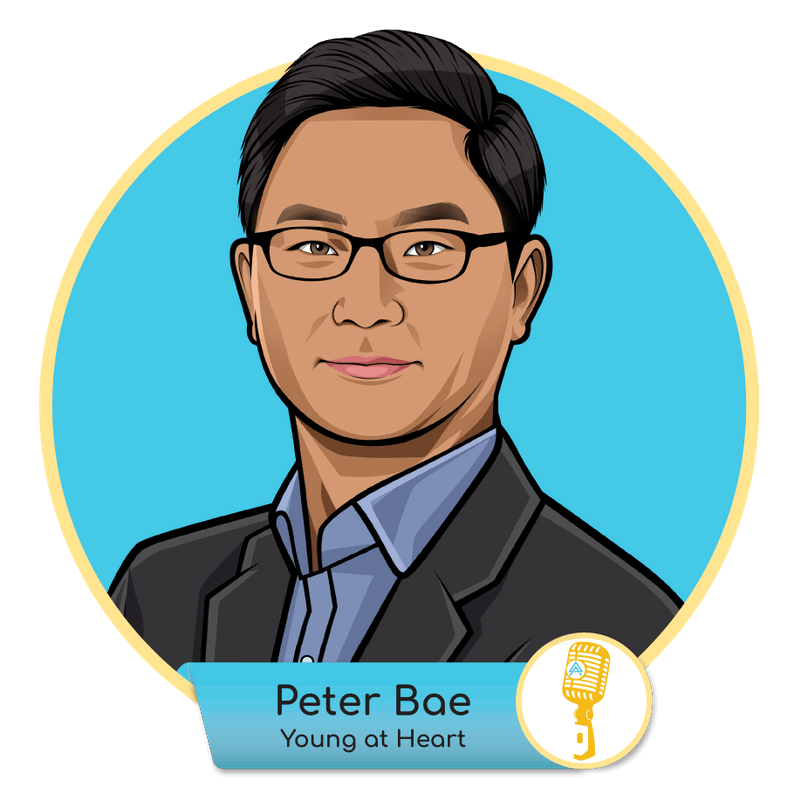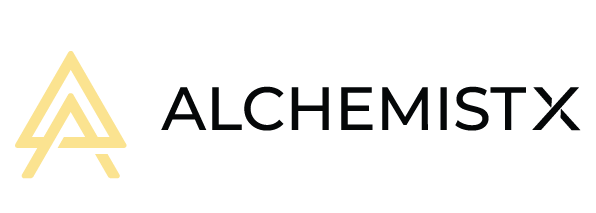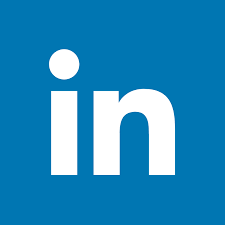In this episode, Marcelo Calbucci breaks down the innovation habits that shaped his career at Microsoft, Amazon, and across six startups. He explains why small, fast iterations beat big plans, how narrative driven strategy unlocks clarity, and why today’s founders should embrace niche, hyper specialized solutions.

AlchemistX: Innovators Inside
E. 30 - Peter Bae: Young at Heart
Published on
March 17, 2022
"Today, startups are disrupting in a way unbeknownst to them. We are disrupting what we were believing so hard, and what we are trying to keep so hard." - Peter Bae
Show Notes
Rachel Chalmers:
Today, I am delighted to welcome Peter Bae to the show. Peter is the new Executive Director for the Korea Innovation Center (KIC) Silicon Valley Support Startups, launching their products and services in North America through acceleration programs, industry expertise, and capital networks. It also helps North American startups launch their products and services in Asia via South Korea. Peter is himself a four-time founder of Social Radio Company, AlcaCruz, Fantage and Anoxis, and a prolific advisor to an investor in startups. He has an MBA from the University of Rochester, and a Bachelor’s in Chemical Engineering from Sogang University. Peter, welcome to the show.
Peter Bae:
Oh, thank you. Thanks for hosting such a lovely introduction. How are you doing, Rachel?
Rachel Chalmers:
I'm really well. It's a beautiful day and it's great to have you here. It's been wonderful to welcome you to the KIC. Can you tell our listeners a little bit about what drew you to this role?
Peter Bae:
Yes. So after my last company, the Social Radio Company, I came upon a certain point in my career, to look back on my career, my family and also myself. And I've been helping a lot of Korean startups enter the US market. And as for my fourth company, I did hit a little bit of a wall for myself. Also, it was time to spend a little more time with my family. And at the same time, I got some other offers from investors and also other accelerators, and I thought, “You know, this venture-building kind of business, I am drawn to it.” Also, personally, you know, “I need to get some time to unlearn what I've learned and maybe relearn.” So all those things kind of came at the same moment, and the Korea Innovation Center seems to be, you know, “OK, there's a lot less traveling and I can stay in the Bay Area a lot more giving myself time for myself and my family.” So I guess those cosmic elements came all together last year, and I took the chance.
Rachel Chalmers:
Yeah, that really resonates. I think a lot of us in corporation come to a point in our career where we want to give back and we want to have that more sort of thoughtful and nurturing life where we draw out excellence in others.
Peter Bae:
Right. And I guess that moment came to me too.
Rachel Chalmers:
Of all of the companies you founded and advised, which has had the best outcome and why do you think?
Peter Bae:
My second company, which is a game company, a web game company, for children, Fantage-dot-com – We started back in 2006/2007, and it grew to where we had users – over 21 million subscribers, and we were competing fiercely neck-to-neck with Disney’s Club Penguin. Looking back (and this is all just looking back), one of the success factors was that I enjoyed it immensely. I had those days where I just woke up filled with energy and I was very happy pushing myself to the limit.
That joy, I wanted to share that joy with my team. The team grew from just two to three, all the way to 65 people. Things meshed and worked very well inside and out, and the company grew. The revenue grew. We had very happy investors, so all the way to the exiting point where we sold the company to a large game conglomerate from Korea. I think that was one thing that stands out from all the other companies where I had more days I couldn't get to sleep versus: I was so happy you know, rushing to get to the office.
Rachel Chalmers:
Yeah, it's so rare to get that flow where the product is selling and the investors are delighted and the employees are delighted. It's a wonderful thing to watch.
Peter Bae:
I'm very lucky to have had that experience at Fantage.
Rachel Chalmers:
So kind of the flip question – it's not usually the most successful company when I ask the question: Which company taught you the most?
Peter Bae:
And that also has a very clear answer, which is my first company, Anoxis. It was an accidental case. It wasn't like I was completely prepared to start this. But the opportunity came along and as for Agilent Technologies, I was a very happy employee working there, but I thought that [starting my own company) was a great opportunity. I did not know what I did not know. Basically, I did not know that I was not prepared. I thought I was prepared, but I was not. But I thought, “You know, I'm in the Bay Area. All my friends are moonlighting. These opportunities can come easily,” and I wanted to challenge myself and jumped into the fray.
However, the four years I was with Anoxis, it was really, really hard: From putting together the business plan, getting the technology up and running, getting the patent, meeting the investors – every single aspect of the startup I stumbled; I fell down. You know, there are so many days and nights that I felt, “Why did I ever start this thing? Where are all these people? Where are all these people with money and experience? How can I meet them?” So that was the hardest. However, looking back, that was the most… How should I say it… It was a crash course? But I learned the most from those mistakes and those sleepless nights. I still have contacts from investors and business people that I met back then. It did prepare me a lot, but at that time, if you asked me, would I ever go back and do the same thing and learn that way? Oh hell no, I sure don't want to do that. I always say it's like those in the prehistoric times where there were a lot of earthquakes and volcanoes, it was so hard. But however, that did give the right ingredients for me to flourish from my second startup.
Rachel Chalmers:
It's the geological activity that provides the energy to sustain life, and it's interesting what you said about your network dating back to then. The friends that you make when your career is going really badly. Those are the really durable ones. You know, success has many friends, but the people who stick around when things are very difficult. I've had the same experience in my career. Those friendships are absolutely ironclad.
Peter Bae:
They're incredible. And now, you know, as time goes by, I also had a chance to help some of those people that I met back then. So yeah, what comes around goes around, and those unexpected connections really last.
Rachel Chalmers:
And that's such an important dynamic in Silicon Valley. We take it for granted that we will work with the same people again and again in different roles over our careers. So there's a very deep commitment to paying it forward, investing in one another, that I think is one of the things I like best about this industry.
Peter Bae:
Yes, that’s one of the words… I didn't know how to describe that word, but “paying it forward” – that was exactly the right vocabulary. I didn't have that vocabulary, but I guess that's what some of us were doing.
Rachel Chalmers:
So what is something Korean companies don't necessarily know when they come to America for the first time, right?
Peter Bae:
And that's really the heart of what I'm trying to do here at K Innovation Center. So like anybody living outside of the US, they look at us through the prism of movies, TV shows, conferences, their friends who live here and and they have that slightly jaded view of how language and culture works in the US. So especially, they have very high esteem about the business, culture and technology culture in the Bay Area. So they prepare technology. They prepare a lot, because they think they're competing with the best of the best in the Bay Area, and that is a good thing. But along those lines, they forget how important the market is and how important it is that that technology element needs to be translated well into products and services. And that gap is, I think, a common thread through a lot of Korean companies. And obviously they haven't lived here, they don't have the right network here, so that is the common gap. Some companies have a small gap. Some companies have such a wide gap that I don't know where to begin to help them. And this is the mantra that's been here in the startup community for a very long time. But still, I keep saying to them, “Before you put too much time and resources into just technology, look at the market. Come look, see, feel, touch, talk and learn about the market before you commit too much, too deep in technology where you can’t just go back or you can’t just easily pivot.” So I guess that that gap, and maybe some companies are too far to do the pivot. Those things are a big challenge for the company and for myself as well.
Rachel Chalmers:
Yeah, it's an old joke that in New York, everyone's writing a novel; in L.A. everyone's writing a screenplay; and in San Francisco, everyone's building an app – and it's a joke with that grain of truth in it. Product really is, you know, in the air we breathe and the water here. It's a constant topic of conversation. And that's part of what makes the Bay Area so unusual, is this 50 year’s track record of building things and putting them into users hands, and trying to distill that institutional knowledge and convey it to people from outside the Bay Area is incredibly challenging and fascinating.
What is something that surprises American companies when they go to Korea?
Peter Bae:
Oh, that's a very delightful question. I think the first thing that they are surprised about and they find this not early enough is that there's a big market in Korea. Wherever we go, we usually look at the map, look at the capital, look at the population. We see a lot of things through just numbers on the paper. But once you go to that specific market, and South Korea is not an exception, you'll see how the market is dynamic. The market is constantly changing, and the market is growing.
I hear a lot of my colleagues who have been introduced to Korea so many times say that (you know, they were so surprised), the level of economic activity in Korea and the people who have disposable income and purchasing power is so incredibly great and dynamic that they would have never thought it worked that way had they not come to Korea and stayed there for three or four months. I think if there's a couple more things that they are genuinely surprised and have a hard time grasping early on, it is the government of the day or the role of the government, because government has always been a crucial element in the rapid growth of South Korea in terms of economics, culture, in every part. They are very, very surprised to learn that there are almost 400 government entities supporting the startup community one way or the other. Four hundred of them, and a lot of startups in Korea take advantage of it, and I give the same advice to companies from the US: Look at them carefully because they’re not only just a resource, but the connections that you make will take you much farther in your business than you think. They're not just there to do one function, but they will open windows and lay bridges for you.
Lastly, just ten years ago, when you’d say startups in Korea, it used to be, “Oh, you were not prepared for working for a conglomerate. You're not becoming a doctor or a lawyer. So you're trying something new. Cute. OK. Good for you,” kind of thing. Now, the professors will tell me that their top students are going to startups. So that startup culture finally took a permanent hold in Korean economic and cultural circles. And that's probably another thing that's very surprising. “Oh, this is not just for a few elite technologists and investors now. It's kind of widespread.” Everybody in every age is… I've seen a 62 year old senior trying to do her role. She's devoted to sustainability, especially in the environment, and she wants to use technology to do her part for her for the next generation. So, OK, now it's really widespread. So those are probably three things that come out of my mind that will surprise anybody who visits Korea with their business.
Rachel Chalmers:
That lady sounds amazing, by the way. Get her to call me. She's exactly the kind of founder I like!
What changed over the last 10 years? Was there a particularly good outcome in Korea? What was the tipping point that made startup culture much more mainstream?
Peter Bae:
I think just like the technology company map here in the Bay Area, you call it FANG (Facebook, Amazon, Netflix, and Google) or, you know, you have your Facebook, you have your Google. So there were two big technology conglomerates in Korea, which were Neighbor and Kakao. Neighbor being the Google of Korea, and Kakao being the dominant messaging app, plus any consumer-related app business. They were two very dominant startup companies for the longest time coming from the second wave of a startup, however, the last I want to say six or seven years, we've seen the most direct visible thing that we've seen is the rise and the exit of companies such as Kupang and Pemain, which is a delivery app. And they had this past unicorn. They had billions of exit, seeing their friends or their seniors retiring, getting millions of dollars, hundred millions, tens of millions of dollars. I want to say they're retiring when they're at thirty eight and thirty nine. And now it's not about, you know, Steve Jobs or Bill Gates. It's like, “Oh, he's a friend of my friend.” So it became very real. And then those two are not the exceptions. We've seen that now we have, more quickly, all these unicorn companies – 15 of them to be exact this year alone became unicorns.
And also, I think it's also a little bit of a lifestyle for Millennials and Gen Zs. Now you can work anywhere. “Ok, I'll be working in Jeju Island.” That culture suddenly became very… So it used to be working at the government in the 60s and 70s; it used to be working at the conglomerate in the 80s and 90s, but now it's like working either crazy [hours] or working life with a balance with your life. Either way, it's working for a company with just 20 people. It's a cool thing. So that kind of caught on really well.
Lastly, I think the convergence between culture and technology, which is basically, like I was saying, working at the game company, was so fun. Now working is fun. Building something is fun. Doing something on your own and being recognized is fun. Obviously, in the background, there's always that the government led the policy led kind of OK conglomerates. They can't grow anymore. Startups are the next thing. So a combination of those factors coming together. The last six/seven years have changed the minds of a lot of people in Korea, and they don't do that very easily. But now it's like, “Oh, my daughter's boyfriend is working at a startup. Hey, that's a good thing now.” It’s changed.
Rachel Chalmers:
I can see it dovetailing with those incredibly rich strands of Korean culture we talked about earlier. You know, the professionalism and sophistication of K-Pop and the self-awareness and self-consciousness of K-Drama. You know, all of those things creating this millennial class that's highly educated, extremely online, and now much more open to new ideas and new kinds of approaches to things.
Peter Bae:
Right, right. And I don't like to put this up front, but the role of the capital. You can't just ignore it. The role of the capital also became very, very important. Ten years ago, getting capital in your company used to be such a hurdle. It used to be such a rare thing, the size of it, the rate of occurrence of it. But now capital is there and we used to joke: Series A in the US used to be like Series B or C in Korea. It's that different. But now it caught up. And just like you said that already existing power and knowledge combined with the capital now is exploding.
Rachel Chalmers:
Yeah. And I'm seeing a lot of the capital coming from the corporate venture capital as well as the conglomerates start to recognize that they have reached the limits of their growth and that they need to diversify and encourage new businesses in order to continue to be relevant.
Peter Bae:
Yes, it's a big theme in Korea.
Rachel Chalmers:
Peter, when you look back on your amazing career to date, what are you proudest of?
Peter Bae:
Oh, this will be very short. No, I think I can relate a couple of things. The one thing is that I started as a Korean American. I started – I jumped into the startup business quite early. That was early 2000, where there were just very, very few Korean Americans in startups, generally in the investment community, generally. So that accidental kind of jumping into the startup business, really shaped my career. Again, it wasn't planned. It wasn't intelligently planned. It was kind of young at heart, and “I really need this challenge” kind of a start. And it didn't go well. Like I said, it really didn't go well. It really burned a lot of things. However, I didn't quit. I just stayed there, my second, my third and fourth company. And I think that's something that maybe there's a little story that I can share.
The second thing that I'm really proud of is in the Bay Area, when I first started a company, I had a very hard time connecting with people because there were not a lot of people who knew how venture capital works, how marketing works. In 2006/2007 (we started in 2007), I was one of the first two people that started a group called Bay Area K Group. Now it's just called K Group. It's a non-profit organization that consists of people working in any technical field, from Google to any technicians working in the Bay Area. So I co-founded that with my friend, Mr. Hong. He was the first CEO at that organization. I was the second. We started with a hundred people when he was CEO. It grew to 500 people when I was the second CEO. Now, we have the 13th CEO, and the membership now is 4,800 people. So there are Korean Americans who work at technology companies and are networking to better either their career or meet the co-founders and talk about the latest technology. It has become the biggest Korean and Korean American nonprofit organization. I'm very proud of that idea and that we executed that idea, which came out of my frustration from my first startup.
Rachel Chalmers:
That's phenomenal. And it is remarkable how many of us, I think, have built those kinds of networks across industries based on other aspects of our identity. I mean, for me, it's connecting with other women in technology. For our founder, Ravi, it's the Indian and subcontinental folks. He just has a connection with those folks, but it is one of the affordances Silicon Valley can be so hard to break into. But if you start building those communities of shared knowledge, it's an incredibly powerful technique.
Peter Bae:
It is, and I hear so many stories not only on startups, but generally people moving into the Bay Area and getting the information and sharing notes with their peers, not on a very official level. This is a very unofficial level, but that's really where things happen. Sparks happen and good information exchanges. And like you said, every culture or every ethnicity or every interest level, there is always that willingness to open up and share, “Hey, I was one step ahead of you. That's the only thing different from you and me. But in two years, you might be ahead of me. So let's share whatever we have and see how big this is. We can grow this pie.” So, yeah, those are such important ideas.
Rachel Chalmers:
And I love the abundance mindset of it rather than, you know, seeing one another as competitors, we can collaborate and make the market bigger for everybody, right?
If you had one do over, what might you do differently?
Peter Bae:
Ooh, ooh, that's a hard question. Probably I would have, and this is a little bit embarrassing, but I think I do want to share that I would have crossed over with many more people, I think, meaning that it was at the beginning. So just connecting Koreans and Korean Americans, that alone is a big job. But also, I mean, there are so many different groups and the meet-ups that I could have gone to. Yeah, maybe that's something that I might have done more to crossbreed or connect between different ideas, generations, cultures and ethnic groups. And maybe that's something that I'll start doing. One of the things that I wanted to also do at the innovation center is to really have some kind of a platform where not only Korean and Korean American startups compete, but it competes with all the other startups from every corner of the globe because every market is unique and every solution is very unique. I am sure there's so many things that we can learn from each other. Maybe one day there will be a platform like that, but yeah, that's something that I might have done better. So I will be doing better.
Rachel Chalmers:
And on that note, how would you distill all of this experience into two or three lessons for our listeners?
Peter Bae:
You know, maybe... Be in a better position to learn. There are so many good entrepreneurs and so many great technologists and venture capitalists and startup founders. I'm not sure if they started like that accidentally or if there's some institution where they prepared well. But there's so many great minds out there that want to. I think it's a business or, as they say, organization or other. It's developing a technology or researching. There are so many great minds that I don't think I'm in a good position to give them any advice or probably share my experience. But you know, if we look back in 10 to 20 years, we'll be reading articles that this is where a seismic shift is happening in terms of how we live. What is the meaning of a friend and family? What is the meaning of working/life balance? What is the meaning of developing and conserving? What is sustainability? What kind of world are we building to give back to our next generation? I think we are right here. It's all about us doing things today that's going to affect the coming years. So in order to address that, if you look at any market, no one company or no one person can solve it. We are looking at problems that we have to solve together, no matter how much energy I conserve or how much I contribute to either wildlife or the beautiful nature out there. It can't be done unless we do it all together. At least share the shared idea. So I think that's the daunting challenge. And I'd like to ask everybody out there, especially those who enjoy challenges, to disrupt the status quo, to rise up and find new ways that we can work together. So it's not advice. I think that's a challenge I'd like to put out there because I know there's much, much brighter and experienced minds out there. So I'll leave it at that to your question.
Rachel Chalmers:
That's a fantastic challenge and really insightful. You're not alone, certainly in reassessing your values and your life circumstances in the wake of the pandemic. I think we've all seen the relatively lackluster response from governments and drawn the obvious connection to the climate emergency. And I think you're right that building a shared understanding of the challenges we face is probably the biggest problem facing us today.
How do you avoid burnout?
Peter Bae:
You can imagine my first startup. I slept three to four hours every day. I think I lost where I put my Sundays and Saturdays really. I think I'm not talking alone here. Anybody who's in a startup business must have been in the shoe and knows exactly what I'm talking about. In my second startup, there were two things that I picked up: One is golf and the other is food. When I'm playing golf and when I'm eating or preparing food, I turn the switch off, and it's been more than 10 years that I've done that, and now I do that kind of automatically. I like to wake up early, but I only like to wake up early; I can't wake up early. The only time I wake up early, voluntarily and happily is when I go golfing. You have to have one or two things like that that you can absorb yourself. And I love cooking and entertaining my family and my friends. And that's just, you know, “Oh, this is where I get energy. This is where it gets me to my next barbecue party.” So, Rachel, you're invited to my next big party. Yeah, it's a Korean barbecue.
Rachel Chalmers:
I will absolutely take you up on that. I also love food.
What is the best way for our listeners to connect or follow your work other than, you know, coming along to the next barbecue?
Peter Bae:
I'm not very good with social media, so I do have Facebook and the LinkedIn account, but I don't use that so much. What I'm trying to do here at K Innovation Center is if you're ever interested in Korea as a market or as a travel destination or as a cultural destination or a foodie destination, do look up the K Innovation Center website. I'm putting as much of my knowledge and time into bringing together not only just a business, right, but the culture together. So K Innovation Center through the website and its social media handles. That's the best way to find me and to find entrepreneurs from Korea and Asia. And because that's where I'll be the next few years.
Rachel Chalmers:
So let's say for the next five years, everything goes exactly the way that you would like it. You push the industry in exactly the directions that you want it to go. What does the world look like five years from now? How is it different?
Peter Bae:
Hmm. I can tell you one thing for sure is that a lot of new fusion of ideas will be out there. Whether it's a form of a business or it's a form of entertainment, or it's a form of a non-profit organization's purpose. I truly believe that and I've seen it with this for such a long time that the collective knowledge, the fusion of knowledge will be the next thing. You think. I think. We think. What we know and experience through books, through our education and through our business, we think we know enough, but actually there's a lot more to it if you start mixing it together, and I’m big on mixing people and ideas. So I don't know what kind of form it's going to take, but I'm trying to enable that to go over the language barriers, to go over the cultural barriers and go straight to the point. Open up. Be embarrassed. Listen, try to understand. And then the second and third meeting, you'll be in a place where you’d never have guessed you'd be had you not done that. Both my job and also what I'm looking forward to, even after helping build companies. I think it's going to be, “How can I make, you know, ideas and people mixed together and come up with something radical and execute those mixed ideas and see where we go?”
Rachel Chalmers:
And honestly, I think it's easy in some senses for Americans to be complacent because there is so much happening here. But the success of things like Parasite and Squid Game, I mean, I take your point about Zoom. It can be a really shallow medium, but film and television and books can be a very deep medium. And I think just that openness and curiosity to another culture, I think people were really surprised given the language barrier, how funny and relatable and charming the characters in Parasite and Squid Game are. And I think that's hopefully waking people up to how much connects us even beyond these challenges of language and culture.
Peter Bae:
Yes, because I think those things, those cultural cinemas or songs, I don't know how, because I don't I can't make them, but they are very good reflection of where we are at now, and they're using a different language to tell that. So the very core establishments that we thought it was very necessary from the schools, to working 9-5 hours, to being efficient with our resources. Those are things that shaped our father’s and mother’s minds, and that's how we are here. But there might be something more to that, right? Is that: “Do we really need this much stuff to live; do we really need this much stuff to be happy? Why are we so insecure all the time? What is happiness really about?” Maybe it's just me but having done so many businesses and being so much away from my family now, I kind of understand and open my eyes there. “Why are we living so hard,” right? “Why are we being so over-educated and why are we putting so much stress on our tribe alone where when we can open up and put things together, we can be happy with much less?”
Today, startups are disrupting in a way unbeknownst to them. We are disrupting what we were believing so hard and what we are trying to keep so hard. But I think the next generation of startups will know much better the purpose of why we are doing this because we don't need to have that much. We don't need to achieve that far and destroy so many things on the way. There must be another way of doing it, and I think that's the next generation of startups, and hopefully we are at the beginning of that.
Rachel Chalmers:
Peter, you are a philosopher and I'm very excited to live in the world that you're creating. What else should I have asked you?
Peter Bae:
I wanted to talk a little more about the K Innovation Center. We are a very small organization. We’ve been here only six/seven years, but we are the only organization out here that's partially subsidized by the government that wants to be the bridge. So a lot of exciting companies already since I took over this job have asked me, “We were planning to do A) in the US market, but now you're at the helm of this organization. I'd like to listen to your ideas on what we can do differently.” And I love those questions, and not just small startups, big startups are asking those questions. Education startups, alternative meat startups, food tech, fashion tech, health tech – great ideas need some help with their products and services in the US, but they want to find a different way of doing it. What I'm trying to do is connect people who can enable that here for US and Korean startups as a connector, connecting the dots as an entity that has the facility here, a co-working space, dedicated rooms here, and we have a huge facility here in San Jose. I'd like to utilize all those assets or material space so that that can happen. I still haven't found out if this year will be the experimental year, and I still haven't found out the best way to do that, or the best practice. But this will be the experimental year. So anybody listening to this and interested in this, I invite you to swing by and share your ideas and see how far we can get together.
Rachel Chalmers:
Fantastic, Peter. It's been such a pleasure to have you on the show. Thank you so much.
Peter Bae:
Thanks so much, Rachel. Good questions always open up the mind, and kudos to you and your team. It's been a pleasure to speak out and share my story.
References
Peter LinkedIn on LinkedIn
Korea Innovation Center (KIC) Silicon Valley Where Peter is the new Executive Director
Social Radio Company One of Peter’s first startups
AlcaCruz One of Peter’s first startups
Fantage An online web game; one of Peter’s first startups
Club Penguin Fantage’s competitor
Agilent Technologies Where Peter worked before starting Anoxis (his first company)
Squid Game Korean TV show popular around the world
Parasite A Korean movie popular around the world
Neighbor Korean conglomerate
Kakao Korean Messaging App
Intro and Outro music composed by: www.PatrickSimpsonmusic.com
Recent Episodes

How to Turn Information Overload into Signal with Syncro Founder Yunsu Tang
In this episode of Innovators Inside, Hong Kong–raised entrepreneur and two-time TEDx speaker Yunsu Tang shares her journey from a stable corporate career in Hong Kong and Shanghai to rebuilding in London’s startup ecosystem.

Why High Achievers Burn Out and How Conscious Leaders Break Through
Why do so many high achievers hit every goal, earn the title, build the company, and still feel lost or unfulfilled? In this episode, Dr. Sharon Spano PhD explains what actually happens when driven founders and executives outgrow hustle and need a deeper way to lead.

.svg.png)








.jpg?width=767&name=IIS7%20SQ%20Thumbnail%20(1).jpg)